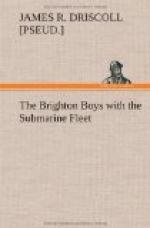Later in the day Jack was transferred to a hospital ship. All the allied wounded from the sea battle off Zeebrugge were to be sent to England. Captain McClure was grievously wounded. Jack would not be able to resume active service for some time, so his surgeon said, and would probably be invalided home.
In due time Jack arrived in London, where for a time he was a patient in one of the American-endowed hospitals. Within a week he was joined by Ted. The latter had been granted a leave of absence. Together the two young lieutenants took passage on a steamship bound for New York, and, braving the perils of the submarine-infested sea, crossed to their own dear old U.S.A.—–“the home of the free and the land of the brave.”
And now we shall leave them. Suffice to say that after a several months’ sojourn at home they returned again to the field of activity to resume their places in the U.S. fleet and continue in service until the end of the war, reaping new honors for themselves, their alma mater and their country.
Of course, before they went back to rejoin “Little Mack,” Bill Witt, Mike Mowrey and all their old seafaring mates, they visited Brighton.
It was late afternoon of an October day when the young lieutenants, spic and span in their uniforms, walked briskly up old Pine Street to the campus of Brighton. Many of the students were loafing about the campus awaiting the ringing of the dinner gong when the boys arrived.
Hardly had they climbed the gray stone steps leading to the campus, however, before they were recognized.
“Hurrah for Jack Hammond and Ted Wainwright!” the cry resounded. Word of their arrival spread through the dormitories and soon a mob of chattering schoolboys surrounded the two young officers. As the dinner gong sounded, the heroes were hoisted to the shoulders of their old chums and carried into the dining room. There they met all the “profs” and were compelled to hold an impromptu reception while the dinner waited.
The study period that night at Brighton was set back an hour. Brighton had her heroes at home, and she was doing them full honor. Many of the boys had enlisted in the various branches of service and were now “over there.” But those who remained held a joyous reception in honor of the two whose stirring deeds had brought such signal honor to the school that had sent them forth.
A few minutes after ten o’clock, when all the boys had been rung to their rooms and lights were out, two young naval lieutenants stood at the foot of the campus, gazing back at the facade of the familiar old dormitory, its windows framing the heads of many youths who were shouting a farewell to their old friends.
The boys stood in silence contemplating the picture—–listening to the chorus of good-bys.
Ted was first to speak.
“I guess it was worth while, chum—–our going away to serve our country and coming back to get a reception like this,” he faltered.




